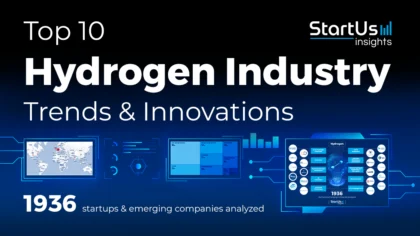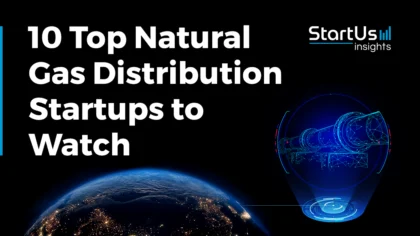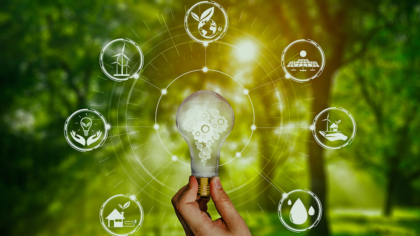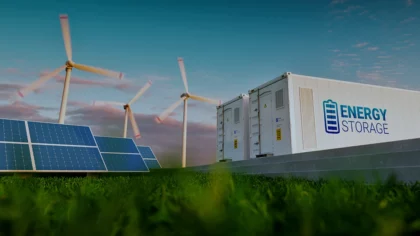Energy startups are at the forefront of innovating the industry by introducing energy storage, carbon capture, smart metering, and more. These companies are improving efficiency, promoting sustainability, and driving the transition to cleaner energy sources.
In this article, we spotlight ten notable energy startups and companies to watch in 2025. Also, we highlight their contributions to modernizing energy delivery and encouraging a more sustainable future.
Global Startup Heat Map highlights 10 Energy Startups to Watch
Through the Big Data & Artificial Intelligence (AI)-powered StartUs Insights Discovery Platform, covering over 7M+ startups, 20K+ technology trends plus 150M+ patents, news articles & market reports, we identified 1050+ energy startups.
The Global Startup Heat Map below highlights the 10 energy tech companies you should watch in 2025 as well as the geo-distribution of 1050+ startups & scaleups we analyzed for this research.
According to our data, we observe high startup activity in the United States and Western Europe, followed by India. The top 5 Startup Hubs for energy are London, San Francisco, New York City, Bangalore, and Singapore.

Meet Emerging Energy Startups to Watch in 2025
We hand-picked startups to showcase in this report by filtering for their technology, founding year, location, funding, and other metrics.
These 10 energy startups work on solutions ranging from energy storage management systems and flexible energy transition to smart metering and lithium-ion alternatives.
- tranXenergy – Energy Storage Management System
- Sosna Metelyk – Cryogenic Passive Direct Air Capture
- Cartesian – Flexible Energy Transition
- SpotmyEnergy – Smart Metering
- MarkeDroid – Virtual Power Plant
- Plural Energy – Energy Transaction Platform
- StellarBlue – Time Series Energy Forecasting
- Texture – Asset Visibility Platform
- Flow Aluminum – Lithium Ion Alternative
- CalibSun – Solar Energy Predictions
1. tranXenergy
- Founding Year: 2023
- Location: Petaling Jaya, Malaysia
- Use For: Energy Storage Management System
tranXenergy develops AI-driven energy storage management systems that optimize renewable energy utilization through predictive analytics and real-time control algorithms. The platform analyzes historical data, weather patterns, and consumption trends to predict energy storage needs and automatically adjusts flexible capacity across storage devices.
It also integrates with various energy infrastructure components, balancing production and consumption while identifying revenue-generating opportunities through multiple storage use cases.

The technology delivers operational efficiencies by providing real-time energy flow insights and automated optimization. This enables commercial businesses to reduce waste and improve return on investment (ROI). Moreover, it serves enterprises requiring scalable solutions for modern energy challenges by offering tools to convert storage assets into value-creating components.
Further, the startup accomplishes this within smart grid ecosystems through machine learning-enhanced decision-making and cross-platform compatibility.
2. Sosna Metelyk
- Founding Year: 2023
- Location: Dallas, Texas, USA
- Use For: Cryogenic Passive Direct Air Capture
Sosna Metelyk develops portable micro solar carbon capture energy pods that enable direct air carbon capture and solar energy production. Its technology combines cryogenic passive systems with configurable designs to extract carbon dioxide from ambient air efficiently. It also simultaneously generates clean energy through integrated solar panels.
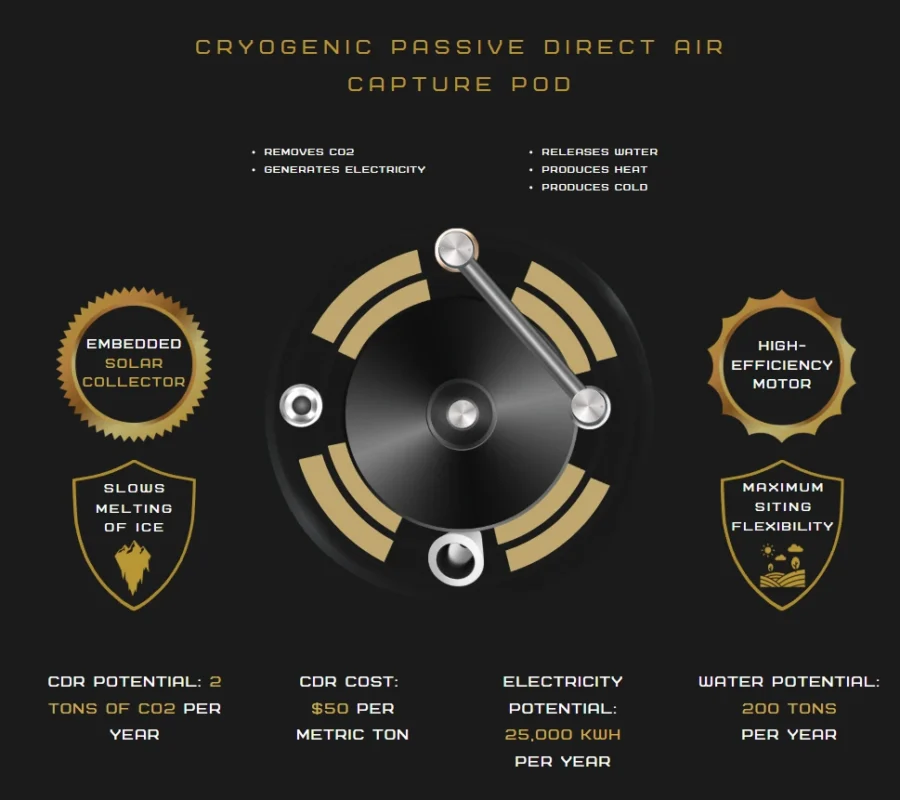
The pods are compact, adaptable, and engineered for diverse applications, including clean engines, space exploration, and aviation, ensuring reliable performance across industries. Moreover, the startup provides a swift decarbonization solution and produces sustainable energy. It further addresses critical environmental challenges and drives the transition toward a cleaner future.
3. Cartesian
- Founding Year: 2023
- Location: Trondheim, Norway
- Use For: Flexible Energy Transition
- Funding: Received NOK 23 million in addition to NOK 8 million of R&D funds
Cartesian develops modular thermal energy storage systems for large-scale heating and cooling applications. The systems have phase change materials (PCMs) that absorb and release energy during solid-liquid transitions.
Moreover, the startup integrates its compact thermal box technology into existing building infrastructure. It connects with water-based HVAC circuits to store surplus energy during off-peak periods and discharge it during high demand, thereby reducing peak power loads and operational costs.

The system employs customizable PCMs capable of operating across temperatures from -20 degrees Celsius to 120 degrees Celsius. The solution uses stackable modules to match diverse building requirements while maintaining a long lifespan and high energy density for space efficiency.
Further, the technology addresses grid flexibility challenges in the energy transition. This enables commercial facilities to optimize renewable energy utilization and lower infrastructure investments in heating or cooling plants. It also stabilizes electrical grid demand through predictable thermal storage cycles.
4. SpotmyEnergy
- Founding Year: 2023
- Location: Cologne, Germany
- Use For: Smart Metering
- Funding: Raised USD 11 million in seed funding
SpotmyEnergy develops smart metering systems and energy management solutions. The startup integrates flexible power consumers with photovoltaic producers through real-time data monitoring and dynamic electricity tariffs.
It also combines smart meters, energy management software, and time-of-use pricing to optimize household energy consumption. Additionally, the platform automatically aligns high-demand devices like electric vehicle chargers and heat pumps with periods of low market prices to reduce consumer costs.
The system connects solar panels, home batteries, and HVAC systems to a centralized platform. It thus enables easy adjustments of energy flows based on wholesale electricity prices while reducing grid dependence and lowering user costs.
Further, the solution employs intelligent trading algorithms and compatibility with diverse manufacturers’ devices that enable hardware-agnostic operations. The startup thus converts households into active grid participants that stabilize renewable energy integration and improve the green transition through decentralized demand flexibility.
5. MarkeDroid
- Founding Year: 2023
- Location: Tallinn, Estonia
- Use For: Virtual Power Plant
MarkeDroid operates an AI-driven virtual power plant platform aggregating decentralized household energy assets. This includes solar panels and batteries in a cloud-based network. The platform also utilizes weather forecasts and hourly electricity market prices to optimize energy trading decisions 24 hours in advance.
Additionally, the platform analyzes individual consumption patterns, production capabilities, and grid demand. Based on this analysis, it autonomously allocates stored or generated power between home use, battery storage, or grid sales. This allows for shifting loads to low-price periods through smart meters and IoT-enabled devices integrations.
Further, the startup’s asset-agnostic architecture supports existing HVAC systems, electric vehicle chargers, and diverse manufacturers’ equipment with a 10-minute setup process. This enables businesses to reduce grid dependence by 50% while earning recurring revenue from surplus energy trades.
The startup’s solution thus decentralizes energy management through virtual power plants that balance profitability with grid resilience during the transition from fossil fuels.
Want to Explore 1050+ Energy Startups & Scaleups?
6. Plural Energy
- Founding Year: 2023
- Location: San Francisco, California, USA
- Use For: Energy Transaction Platform
Plural Energy tokenizes renewable energy assets to enable fractional ownership through blockchain-based securities. These securities represent stakes in solar farms, battery storage systems, and distributed generation projects.
Additionally, the startup converts physical installations into digital securities using smart contracts. It then automatically distributes dividends based on real-time production data and predefined revenue-sharing agreements. The platform also maintains SEC-compliant ownership records through on-chain cap tables cross-referenced with KYC databases.
Moreover, the platform employs asset-agnostic tokenization standards compatible with ethereum virtual machine (EVM) networks like Base and Avalanche. This allows hourly dividend accruals and secondary trading potential on decentralized exchanges.
7. StellarBlue
- Founding Year: 2023
- Location: Thessaloniki, Greece
- Use For: Time Series Energy Forecasting
StellarBlue develops AI-powered energy forecasting software that analyzes historical consumption patterns, weather data, and market signals to predict electricity demand and renewable generation.
Additionally, the startup integrates neural networks with statistical optimization in its ATLAS platform. This platform processes terawatt-hour-scale grid information to generate hourly forecasts for solar farms, wind plants, and industrial consumers. It also simulates balancing market dynamics through the digital twins of regional power systems.

StellarBlue’s modular architecture also supports customized forecasting pipelines combining photovoltaic production predictions from satellite irradiation maps with load profile analytics. This enables utilities to automate day-ahead bidding strategies and reduce imbalance costs.
Further. StellarBlue bridges operational planning with real-time energy trading decisions. This enables grid operators to manage volatility from increasing renewable penetration. It also maintains N-1 security standards through probabilistic congestion forecasts updated every 15 minutes.
8. Texture
- Founding Year: 2023
- Location: New York, USA
- Use For: Asset Visibility Platform
Texture offers a real-time asset visibility platform that aggregates and standardizes data from distributed energy resources (DERs). The platform integrates resources like batteries, solar arrays, and heat pumps across utility networks through direct integrations with device application programming interfaces (APIs) and third-party applications.
Additionally, the system processes terawatt-scale telemetry from DERs, weather feeds, and market signals to create unified operational dashboards that detect grid anomalies. This optimizes device dispatch while enforcing granular access controls for secure cross-organizational data sharing.
Its architecture supports batch control of heterogeneous assets through manufacturer-agnostic rules engines. This enables utilities to coordinate preventative maintenance cycles and balance renewable generation against demand fluctuations without replacing legacy infrastructure.
Further, Texture serves as an interoperable layer for the distributed energy economy. This lets grid operators and DER owners manage capacity and stabilize networks during renewable intermittency without exposing proprietary systems or consumer data.
9. Flow Aluminum
- Founding Year: 2023
- Location: Albuquerque, New Mexico, USA
- Use For: Lithium-Ion Alternative
Flow Aluminum develops aluminum-CO2 batteries that replace lithium-ion technology. The electrochemical reactions flow between recycled aluminum anodes and carbon dioxide during charging cycles. The system also stores energy by converting aluminum and CO2 into aluminum oxalate within a sealed PowerCore Capsule.
It achieves energy density through ionic liquid electrolytes that facilitate rapid ion transfer while absorbing ambient CO2 for partial sequestration.
Additionally, the modular architecture supports grid-scale deployments with 10-100 hour discharge durations. The architecture utilizes non-flammable materials and operates across -40 degrees Celsius to 60 degrees Celsius without thermal runaway risks.
The technology eliminates cobalt, nickel, and lithium dependencies by using recycled aluminum supply chains and standard manufacturing processes.
Further, the startup addresses renewable energy intermittency and industrial decarbonization by providing fire-safe, high-capacity storage solutions for microgrids and electric vehicles. The solution combines scalable CO₂ utilization with price-stable materials to accelerate the transition from fossil fuels.
10. CalibSun
- Founding Year: 2023
- Location: Sophia Antipolis, France
- Use For: Solar Energy Predictions
CalibSun offers AI-powered solar forecasting solutions that combine numerical weather predictions, satellite imagery, and on-site sensor data. The startup’s machine learning algorithms predict photovoltaic energy production from 15 minutes to one week ahead.
Additionally, the system processes meteorological models like the global forecast system (GFS) and Arome alongside real-time satellite feeds from MSG and Himawari. It improve forecasts every six hours while incorporating localized plant configurations and historical irradiance patterns. This allows the system to generate probabilistic scenarios with high confidence intervals.

Calibsun’s modular API integrates directly with energy management systems, enabling grid operators to balance renewable intermittency and storage dispatch.
Further, the Cube service provides developers with autonomous measurement cabins for year-long site irradiation analysis to secure project financing. The platform employs a patented feedback loop that continuously retrains models using live power plant data and custom asset parameters.
Discover All Emerging Energy Startups
The energy startups showcased in this report are only a small sample of all startups we identified through our data-driven startup scouting approach. Download our free Energy Innovation Report for a broad overview of the industry or get in touch for quick & exhaustive research on the latest technologies & emerging solutions that will impact your company in 2025!




